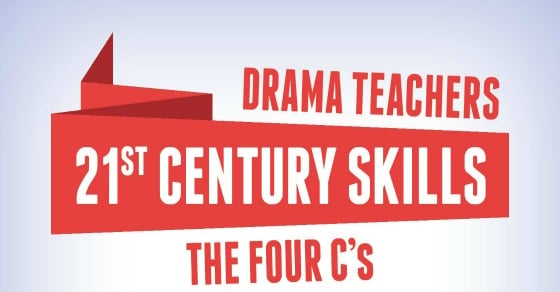Agatha Rex by Lindsay Price is a bold high school take on Antigone - packed with heart, conflict, and a powerhouse ensemble. One girl. One stand. One huge risk. *NEW COMPETITION VERSION AVAILABLE!*
Growing Your Drama Program Through Outreach
“There are two ways of spreading light – to be the candle or the mirror that reflects it.” ~Edith Wharton
I was very lucky growing up where I did.
I grew up in North Bay, Ontario, Canada. Population 50,000.
What we lacked in numbers we made up for in theatre. We had a very active high school theatre scene. It was very competitive, too. Our school never won much of anything but I loved it all the same.
In the summer, drama kids (and non-drama kids) from every school in the city would get together and perform a musical. The program was called Summer Challenge and the super-amazing Marty Southcott would cram casts of 100+ onstage.
Rehearsals were in the evenings, but my fondest memories come from the afternoons. There was always some kind of activity in the afternoon for kids who didn’t have summer jobs. We’d have a baseball game, put a float together for the Canada Day Parade, etc.
We also did our fair share of community outreach such as singing at nursing homes. I loved the outreach activities the most.
Community outreach is a wonderful way of building awareness for your program, growing your program, and making it flourish. It confirms how important a role you play as an arts leader. And, most importantly, it’s a way of giving back to the community that supports you.
Here are some tips and ideas to get your outreach program off the ground.
Outreach within your program
The first community to look at is your own – the community of drama makers in your program.
Orientation
Welcome new students to your program with an orientation get-together. Do this even before you hold auditions.
Talk a bit about your plans for the year, the shows you’re doing, schedules and expectations, and the opportunities for involvement. Get everyone excited about what’s to come.
But don’t make it all about you, make it about them. Turn the rest of the session over to your senior students.
- Have your seniors perform a scene from last year’s show.
- Have a senior talk about their first audition for you, what it was like, how they felt then, how they feel now.
- Do a modelling exercise. Auditions are very mysterious and scary for newcomers. Stage a mock audition so your newbies can get an idea of what to expect. Show them what a good audition looks like and what a bad audition looks like and discuss the differences.
- Have your tech kids describe the various behind the scenes opportunities for kids that don’t want to be on stage.
- Promise to find a role (onstage or off) for every kid who is interested and is willing to put in the time. And keep your promise. It’s not possible to have a lead (or even a speaking role) every time, and not every script lends itself to having dozens of bodies on stage, but there’s always a place for extra offstage personnel. Keep kids interested in coming back and if you have way too many actors this time, you know that next time you’re going to need to do a show with a larger cast.
Peer Leadership
Empower your seniors to welcome the new kids and to give them tools to flourish in your program. Seniors can help with:
- Audition preparation
- Learning lines
- Choreography / blocking review
- Modelling rehearsal etiquette
- Modelling backstage etiquette
- Learning a new technical skill
Break up cliques
Every group has cliques, this is unavoidable. And cliques can be harmful when you’re trying to build a community. Take note of the cliques that form within your group. When you’re casting a show, it might seem like a good idea to keep the cliques together, but this comes at the expense of being an inclusive program.
Spread the wealth
It’s tempting to always give your “best” kids the “best” roles. And every so often you get that awesome class who you want to work with forever. Avoid casting the same kids in the “best” roles. It discourages your newer kids and when that perfect class graduates you’ll find yourself back at zero.
Reward your kids for making it through the year
Hold an “End of Year” award ceremony. Let off the steam from the stresses of the past year and celebrate everyone’s accomplishments.
Be creative with the awards. Some ideas:
- Most offstage hours put in by a student who wants to be onstage
- Scariest backstage “disaster”
- Peer mentor of the year
- Most promising newcomer
- Best “rise to the occasion” moment
School Community Outreach
Outreach within your school community can raise awareness of your program and boost your numbers. The more awareness there is for your program, the bigger the involvement, the more ammunition you’ll have when budget cuts threaten its existence. Here are some ideas to keep your program front and center in the minds of your school community.
Have a “Job Fair”
When people think of a drama club, they think of acting in plays. So if kids aren’t interested in acting, they won’t think to get involved in your program.
Hold a job fair to raise awareness of all the myriad other talents that we need in the theatre.
Your school is teeming with talented kids who aren’t actors, but would still be excellent assets to your program. Mine those talents!
Find the musicians in the school. Even if you’re not doing a musical, many plays can benefit from some live music, perhaps as underscoring, or to transition between scenes.
Here’s an example of a student who scored and performed music for Bradley Hawyard’s Sixteen in 10 Minutes or Less.
Find the artists in your school who can help with scene painting. Find the kids who are good at building stuff to help with props. Find the kids interested in fashion to help with costumes. Find creative writers to develop into playwrights. If you’re doing a show set in a different time or place, get the kids who are good at geography and history to put together a presentation for you. The possibilities are endless.
Put yourself on the agenda
I think that one of our jobs as theatre educators is to be an advocate for art and that means we have to educate administrators, we have to educate school board. We have to go, every time you get a trophy, whether we love or hate that competition element, that you make an appointment with the school board, you take your students, you’re on the agenda, and you thank them. ~ Gai Jones
Gai is absolutely correct. Any prize, any success, any inspiring story that comes out your program should go right on the agenda – at board meetings, staff meetings, morning announcements, and media channels like an inter-school radio or TV station.
Here’s another one – if you win an award at a drama competition, don’t keep it in your room. Get your award in the trophy case right up there with the sports awards. Show the school what you do and let your program be celebrated along with sports.
Don’t be afraid coming across as a braggart. Think of it as an expression of pride and excitement for your program. The underlying message is “My program matters, it is successful, and it is having an impact on the lives of my students.”
Keep “binders full of success”
When something good comes out of your program, document it no matter how minor it seems.
You don’t have to win first prize at a competition to succeed in theatre. Make note of things like growth in participation, attendance, and production values.
Keep records of anecdotal evidence of success such as shy students who speak on stage for the first time or kids who are staying in school specifically because they want to stay in your program.
Hold an open rehearsal
Hold an open rehearsal midway through your rehearsal process.
Allow a set number of interested students to come watch the creation process in action. This serves two purposes. For the viewers, it pulls back the curtain and demystifies what happens in a theatre rehearsal. For the cast, it can be a reminder that they need to pay attention to things like diction and clarity even in rehearsal.
Be sure to emphasize for both audience and performers that this isn’t a performance. It’s something different that only a select few get to see in action.
Organize a Staff Show
Choose a short piece of reader’s theatre (so you don’t need to devote much time to rehearsal) for members of your school’s staff to perform.
Use it as a curtain raiser for the main show. This will surely help boost attendance as well as involve more of the school in your wonderful drama program!
Arts Night
Co-ordinate an Arts Night with the other arts departments at your school.
Tour a Short Show to Other Classes
This tip came from our Facebook page.
Jessica writes: “My intro to theater class does a unit on oral reading. The high school where I teach has a child care center in the building and we read to those kids during that unit.”
Offer Backstage Tours
Offer backstage tours to your school community. Those of us who work in theatre forget how magical and mysterious the moving parts are that go into making a play. Pull back the curtain. Show others around your workspace.
Choose a significant costume and prop from a past or current production. Talk about the elements that went into the item’s design and construction.
If you’re lucky enough to have a well-equipped facility, demonstrate how your technology works. Show off your lighting and sound equipment, etc.
Tours like this highlight how theatre is a team event. It requires many people working together to make it happen.
Greater Community Outreach
Use some of these ideas for outreach in your greater community. You will raise awareness of your program, but even more important, you’ll be bringing light to people’s lives.
Sing at Seniors’ Centers
Do you do musicals at your school? Brighten the day of the residents at your closest nursing home. Bring a handful of students and sing a selection of songs from the show you’re working on as well as some “golden oldies.”
Offer Improv Shows
Do you have an improv team? Find places in your community for them to perform. Places like cafés and libraries often have opportunities.
Visit Your Feeder Schools
Get ‘em while they’re young! Visit schools that feed students into your program and get them excited about what’s to come.
Tour a short TYA show into your feeder schools. Better still, make it part of a playwriting unit with your class. Have them write and produce the show themselves.
This also comes from from our Facebook page.
“My Actors’ Studio and Theater Production classes also work together every year on a children’s show that we bring to the kindergarten in the district. That one was going on for a million years before I got there and has become a well loved tradition. Both have been great experiences for everyone involved!”
If you can’t do a tour, put a show together and invite your feeder schools to your school.
Hold a Talkback
Choose one night per show run to hold a post-show talkback. Audiences are very curious about how shows come together. Be prepared to discuss the rehearsal process, the creation of interesting props and set pieces, and the themes and content of your show. And be well-prepared for the number one question asked by audiences… How do you learn your lines?
Join Forces
Partner with other schools in your area to host a non-competitive one act (or ten minute) play festival. Instead of “best show” type prizes, why not give a prize to the school that sells the most tickets?



